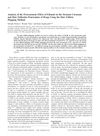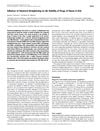 14 citations,
May 2011 in “Facial Plastic Surgery Clinics of North America”
14 citations,
May 2011 in “Facial Plastic Surgery Clinics of North America” Laser hair removal is effective for dark hair but needs improvement for nonpigmented or fine hairs.
 14 citations,
May 2008 in “Journal of proteome research”
14 citations,
May 2008 in “Journal of proteome research” Dutasteride may help reduce brain plaque linked to Alzheimer's by affecting cell energy structures and waste removal.
 13 citations,
February 2018 in “Plastic and Reconstructive Surgery”
13 citations,
February 2018 in “Plastic and Reconstructive Surgery” The study found that a specific signaling pathway helps skin wounds heal faster but may lead to larger scars.
 13 citations,
July 2017 in “Biopolymers”
13 citations,
July 2017 in “Biopolymers” Recombinant keratins can form useful structures for medical applications, overcoming natural keratin limitations.
 13 citations,
July 2016 in “BMC Complementary and Alternative Medicine”
13 citations,
July 2016 in “BMC Complementary and Alternative Medicine” Hominis Placenta helps hair grow back by increasing cell growth and a specific growth factor.
 13 citations,
January 2012 in “International Journal of Trichology”
13 citations,
January 2012 in “International Journal of Trichology” Eating too many paradise nuts for cancer prevention caused a woman to lose all her hair due to selenium poisoning.
 12 citations,
May 2019 in “Stem cell reviews”
12 citations,
May 2019 in “Stem cell reviews” Fetal-maternal stem cells in a mother's hair can help with tissue repair and regeneration long after childbirth.
 12 citations,
May 2016 in “British Journal of Dermatology”
12 citations,
May 2016 in “British Journal of Dermatology” AGA progression involves increased lipid synthesis, electron transport, and hair follicle miniaturization.
 12 citations,
August 2012 in “ISRN Analytical Chemistry (Print)”
12 citations,
August 2012 in “ISRN Analytical Chemistry (Print)” Future work on macrolide antibiotic analysis will aim to enhance selectivity, sensitivity, and efficiency using advanced chromatographic methods.
 12 citations,
February 2006 in “Lipids”
12 citations,
February 2006 in “Lipids” Hair texture changes with age due to varying levels of lipids.
 11 citations,
July 2020 in “Scientific Reports”
11 citations,
July 2020 in “Scientific Reports” Statins may be linked to reproductive organ conditions, and their risks should be monitored.
 11 citations,
May 2019 in “BioMed Research International”
11 citations,
May 2019 in “BioMed Research International” Hair transplantation effectively treats scalp scars with high success and patient satisfaction.
 11 citations,
April 2013 in “Journal of Agricultural and Food Chemistry”
11 citations,
April 2013 in “Journal of Agricultural and Food Chemistry” Monascus helps prevent baldness, prostate issues, and may be a natural alternative to medications.
 10 citations,
January 2014 in “Chemical and Pharmaceutical Bulletin”
10 citations,
January 2014 in “Chemical and Pharmaceutical Bulletin” Ethanol pretreatment affects drug penetration through skin and hair follicles.
 9 citations,
January 2011 in “Skin Research and Technology”
9 citations,
January 2011 in “Skin Research and Technology” The new automatic tool accurately measures hair thickness and is reliable.
 8 citations,
November 2022 in “International Journal of Cosmetic Science”
8 citations,
November 2022 in “International Journal of Cosmetic Science” Human hair varies widely and should be classified by curl type rather than race.
 8 citations,
May 2017 in “Chinese Journal of Integrative Medicine”
8 citations,
May 2017 in “Chinese Journal of Integrative Medicine” Miscanthus sinensis flower extract may help promote hair growth and prevent hair loss.
 8 citations,
March 2017 in “Experimental Dermatology”
8 citations,
March 2017 in “Experimental Dermatology” Finasteride helps female-pattern hair loss.
 8 citations,
October 2014 in “Journal of analytical toxicology.”
8 citations,
October 2014 in “Journal of analytical toxicology.” Chemical hair straightening significantly reduces detectable drug levels in hair.
 8 citations,
January 1996 in “Springer eBooks”
8 citations,
January 1996 in “Springer eBooks” Male pattern baldness may be caused by factors like poor blood circulation, scalp tension, stress, and hormonal imbalances, but the exact causes are still unclear.
 7 citations,
May 2021 in “Applied sciences”
7 citations,
May 2021 in “Applied sciences” Proteins like BSA and keratin can effectively style hair and protect it, offering eco-friendly alternatives to chemical products.
 7 citations,
April 2015 in “Plastic and Aesthetic Nursing”
7 citations,
April 2015 in “Plastic and Aesthetic Nursing” Hair transplantation can effectively restore a natural-looking hairline when properly planned and executed.
 7 citations,
November 2013 in “Pediatric and Developmental Pathology”
7 citations,
November 2013 in “Pediatric and Developmental Pathology” Over half of the children had abnormal hair under a microscope, with many having genetic hair conditions.
 6 citations,
June 2019 in “Skin Research and Technology”
6 citations,
June 2019 in “Skin Research and Technology” Finasteride works for hair loss by maintaining existing hair follicles, not reversing miniaturization.
 6 citations,
April 2017 in “Frontiers in Pharmacology”
6 citations,
April 2017 in “Frontiers in Pharmacology” Chinese medicine may help treat hair loss by affecting genes and enzyme activity.
 6 citations,
June 2016 in “Journal of Craniofacial Surgery”
6 citations,
June 2016 in “Journal of Craniofacial Surgery” Reconstructing lower face gunshot injuries with a fibula and scalp flap is effective and gives good long-term results.
 6 citations,
February 2016 in “Journal of Microencapsulation”
6 citations,
February 2016 in “Journal of Microencapsulation” Improved finasteride formula allows slow, sustained release and better absorption for patients.
 6 citations,
September 2012 in “Clinical Interventions in Aging”
6 citations,
September 2012 in “Clinical Interventions in Aging” Honokiol might help reduce male skin aging by maintaining testosterone levels.
 6 citations,
December 2011 in “Drug Research”
6 citations,
December 2011 in “Drug Research” Finasteride's two formulations absorb similarly, showing bioequivalence.
 4 citations,
January 2021 in “Skin appendage disorders”
4 citations,
January 2021 in “Skin appendage disorders” Washing hair daily is better and preferred, with no negative effects.






























